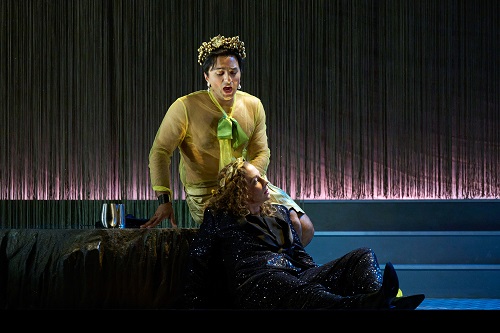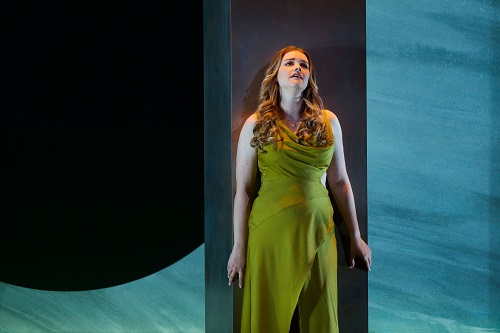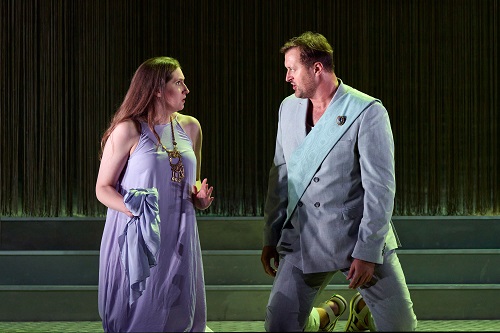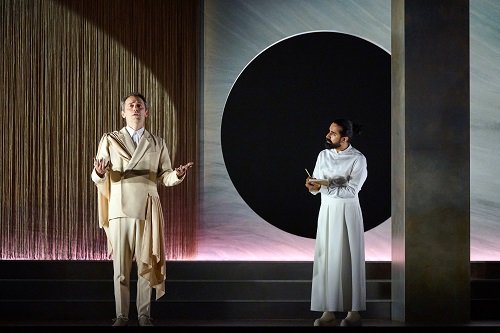English Touring Opera’s Autumn 2023 season opened at the Hackney Empire on Saturday 30 September 2023. This was the first season under new General Director, Robin Norton-Hale, and the opening production of Monteverdi’s The Coronation of Poppea was directed by Norton-Hale and so, much anticipated. Conducted by Yshani Perinpanayagam with Jessica Cale as Poppea, Kezia Bienek as Ottavia, Feargal Mostyn-Williams as Otton, Martha Jones as Nero, Trevor Eliot Bowes as Seneca, Elizabeth Karani as Drusilla and Amy J. Payne as Arnalta, the work was given in a new arrangement by Perinpanayagam with a new English translation by Helen Eastman. Designs were by Basia Binkowska with lighting by Charlie Morgan Jones.
No score of Monteverdi’s original 1643 version of L’Incoronazione di Poppea survives, and what we do have is the libretto from 1643, plus scores from Venice and Naples in the 1650s. All three differ from each other, and the scores are little more than bass line and vocal lines. The performances would have taken place in small theatres with tiny ensembles of instruments and there would not have been a conductor as we know it, the music was mainly arioso/recitative accompanied by continuo instruments with the orchestra, such as it was, employed for ritornelli. This provides a challenge in modern performances, how to expand the work to fit modern theatres and modern theatrical needs. This is especially true of ETO’s Autumn tour, for which the company has paired Monteverdi’s opera with Rossini’s La Cenerentola, thus they either need to tour two entirely different instrumental ensembles or modernise Monteverdi.
For these performances, the decision was to modernise Monteverdi and Yshani Perinpanayagam has arranged the work for chamber orchestra – single woodwind, horn and trumpet, plus strings and percussion with a continuo group of harp, theorbo, harpsichord and cello. Yshani Perinpanayagam has not just re-scored the ritornelli, the opera has received a thorough going-over with much of the accompaniment orchestrated. The results have a strong feel of Respighi’s Ancient Airs and Dances, old music in modern guise. In the performance, there was no attempt at period style and the singers gave a fuller delivery than is often the case in this opera.

What we lost was the fast-paced conversational delivery of the dialogue, the sense that emotions could turn on a pin and the fast alternation between comedy and tragedy. This latter was exacerbated by the fact that comic characters like Valletto and Nutrice were totally absent. The result had a far statelier feel than I would have preferred; the first half (Act One plus Seneca’s death from Act Two) lasted 90 minutes. Individual performances were strong, but the slower pacing meant that, for me, the drama did not quite work, and the orchestration was simply too interventionist for my taste.
Basia Binkowska’s designs were wonderfully stylish, with a fixed, multilevel set that looked stunningly pared back, and modern costumes that often had a nice sense of style. However, some of the imagery was rather confusing – the reason for Lucano (Zahid Siddiqui) being in drag was unclear – whilst the designs for the gods (thankfully present in this version) varied from the imaginative to the fussy, though having illuminated neck bands for them was a neat visual reminder of their difference.
The opening, with Fortune (Elizabeth Karani), Virtue (Julia Marko) and Love (Keith Pun), was both visually and musically arresting, and Pun’s engaging Love (Amor) would be ubiquitous throughout the opera along with Theo Perry’s Mercury.
The opening scene of Act One suffered somewhat because Feargal Mostyn-Williams as Otton seemed rather out of sorts, and he did not really find form until much later in the opera. Mostyn-Williams has an attractive, soft-grained counter-tenor which suits the character and Mostyn-Williams found a sense of Otton’s inner strength as the drama progressed.

Jessica Cale’s Poppea was stylish and elegant. Strong-minded, yes, but always with a considered sense of musicianship and upright bearing. Somehow, she felt far less self-serving than usual, and Cale’s performance was mesmerising, she drew the eye and ear at every turn. She was finely partnered by the Nero of Martha Jones, a character whose gender remained somewhat unclear, perhaps a woman, perhaps a feminine man. What mattered was that Jones sang Nero with a warm, flexible tone and even in the later scenes in Act One, seemed far less neurotic and nasty than usual. In fact, the pairing of Nero and Poppea here seemed much more sympathetic than can often be the case. Their duets, from the opening to the luscious final one, were elegantly seductive.
Kezia Bienek made a regal Ottavia, noble yet with a vicious streak when it came to it. Bienek’s was a wonderfully balanced, consummate performance. Ottavia is often depicted as either a noblewoman wronged (think Janet Baker at Glyndebourne) or a real scheme. Here, Bienek managed to suggest both, and even at her lowest ebb, you never lost the sense of her being Empress. And she sounded fantastic.
Trevor Eliot Bowes was a very self-possessed, almost bumptious Seneca, very full of himself and his philosophy, and he was followed round by a scribe (Sandeep Gurrapadi) who recorded his every word. His contributions in Act One felt rather balanced, the disagreement with Martha Jones’ Nero a long way from a shouting match, whilst his death scene was elegantly done.

Elizabeth Karani, having been Fortune in the Prologue, moved to making Drusilla a very human character and you felt rather sorry for her intense regard for Otton. The scene between Zahid Siddiqui’s Lucano and Martha Jones’ Nero was slightly puzzling. Usually given as a drunken singing contest; here there was a sense of the emotion being real, and was this Nero attracted to Lucano too? Both Siddiqui and Jones made the duet remarkably seductive.
The sole remaining comic character was Amy J Payne’s Arnalta. Payne was wonderfully trenchant and her advice to Poppea was given with strength and wit but never designed to be funny. Payne was gentle in the lullaby and wonderfully combined word and music in her final, great solo.
The smaller roles were all well taken. Zahid Siddiqui was a soldier in the first scene whilst Richard Pinkstone was a soldier and a stylish Liberto in Seneca’s death scene.

As arranger, I felt that there was a bit too much of Yshani Perinpanayagam’s personality in the music than I would have wished, the version was too interventionist. But then, as conductor, I felt that Perinpanayagam was far too inclined to dwell lovingly on details and did wonder what the result would have been like if Perinpanayagam’s orchestration was in the hands of a conductor who took a brisker view of the work.
The tone of the production had not quite settled. Some of the visual clues, such as hints of Paula Rego, did not quite register. It did not help that, lacking the comic characters, there were serious moments that were allowed to be funny. The audience laughing at a serious character’s moment of self-revelation, no matter how unlikely, is not always a good thing.
Helen Eastman’s new English translation felt, at times, to determinedly demotic. At its best it was plain and serviceable with an element of the poetic, but there seemed to be lapses and not every phrase sat happily in the music.
I am aware that this production is going on a substantial English tour and will be seen by many audience members who are unfamiliar with Monteverdi’s opera. As such, the production’s lusher orchestrations and steadier pacing may well make the work more approachable than Monteverdi’s rather fast-paced, somewhat austere original.
Overall, this felt like a work in progress. Monteverdi’s The Coronation of Poppea is an enormous undertaking, with a great deal of music. Including a single interval, this evening was over three hours, that is a lot to rehearse and hone. The company is giving seven more performances of the production, in Leamington Spa, Norwich, Saffron Walden, Snape, Buxton, Exeter and Poole, and you feel that dropping in to one of the later ones might be well worthwhile.
Robert Hugill
Monteverdi, The Coronation of Poppea
Poppea – Jessica Cale, Nero – Martha Jones, Ottavia – Kezia Bienek, Seneca – Trevor Eliot Bowes, Otton – Feargal Mostyn-Williams, Drusilla/Fortune – Elizabeth Karani, Love – Keith Pun, Arnalta – Amy J. Payne, Lucano/Soldier – Zahid Siddiqui, Liberto/Soldier – Richard Pinkstone, Virtue/Popoli – Julia Mariko, Mercury – Theo Perry, Scribe/Popoli – Sandeep Gurrapadi; Director – Robin Norton-Hale, Conductor & arranger – Yshani Perinpanayagam, Translator – Helen Eastman, Design – Basi Binkowsk, Lighting – Charlie Morgan Jones.
English Touring Opera at the Hackney Empire, London; 30th September 2023.
ABOVE:
ABOVE: Jessica Cale, Keith Pun, Julia Mariko, Zahid Siddiqui and Amy J. Payne (c) Richard Hubert Smith